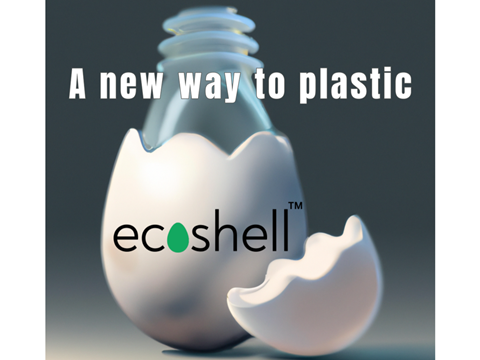
Ecoshell’s GEX solution is derived from eggshells transformed into bio-calcium - a fine powder said to have particles as small as 1 micron – and then pelletized. The company currently offers a range of resins and complete compounds for various applications.
The solution is apparently certified recyclable and can reduce plastic up to 50% and carbon up to 70%, compared to virgin plastics. Ecoshell says GEX is SGS-certified as an effective waste, carbon, and plastic reducer and holds FDA, EU RoHS, REACH, antibacterial, and high FIR emissivity certifications.
The company adds that GEX has recently received a UK patent recognizing it as an eco-friendly material, waste reducer, and manufacturing method that holds the potential to ‘revolutionize plastic manufacturing’.
The versatile material is said to be compatible with a range of plastics including PP, PE, HDPE, EVA, PS, ABS, rubber, PVC and PLA, as well as recycled plastic, ocean-bound plastics, and bioplastics. Ecoshell states GEX is compatible with film blowing, blow moulding, injection moulding, thermoforming, calendaring, and extrusion.
The solution’s potential applications include jars and bottles for the cosmetic, pharmaceutical, wellness and cannabis industries and industrial buckets, bins, and barriers (with a reported plastic reduction of up to 30%); foam mats and gym flooring with 40% less plastic; and trays and industrial packaging made from 50% GEX.
The product aims to offer an affordable and quick way for companies to meet upcoming plastic reduction mandates and can be incorporated into current manufacturing, in an effort to help companies avoid downtime and costly material and machinery development.
Ecoshell founder, Andrew Bliss, commented: “Many brands would like to be more sustainable, but simply can’t afford the material change or the downtime. GEX allows them to meet and exceed their sustainability goals, and to do so very affordably and quickly.”
In August, Bliss explained the company’s solution and his ideas around plastic and carbon reduction to us, as part of our Rapid Interview series. He added that the eggshell material can also make ‘99.9% antibacterial’ products.
Earlier in the year, PAPACKS and European Material Bank (EMBA) signed an agreement to advance the exploration, development, processing, and production of renewable raw materials worldwide including sugar cane, eucalyptus, and bamboo. The collaboration hopes to produce virgin pulp materials directly applicable in the paper-making and moulded fibre packaging industries.
If you liked this story, you might also enjoy:
The ultimate guide to the Packaging and Packaging Waste Regulation in 2024
How are the top brands progressing on packaging sustainability?
Sustainable Innovation Report 2024: Current trends and future priorities
Everything you need to know about global plastic sustainability regulation














No comments yet